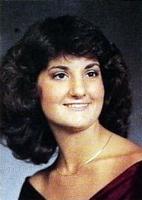|

Jo Frances Heiden, 37, a paraplegic artist who sold gift cards through her business, J.F. Originals, and used the proceeds for myriad philanthropic efforts, died of cardiac arrest and respiratory failure March 25, 2002, at her home in Arlington, Virginia. Long before the accident that paralyzed Ms. Heiden from the shoulders down, her career ambition was to combine art and business. She was a University of Virginia sophomore, when on a hot summer day in 1984, she fell three stories from the balcony of her apartment while sunbathing. She and her friends had removed the balcony's protective barrier to get the full impact of the sun. Dizzy after standing up quickly, she fell. She endured a year-long, intensive regimen for head-and-neck rehabilitation, determined to return to school and complete her degree. Her parents tried to persuade her to stay near home after the accident so they could care for her, but she insisted on returning to U-Va. She received a bachelor's degree in 1987 in marketing and management information systems.
At the university, she worked closely with administrators to make the disabilities code less rigid, and she attempted to demonstrate that a uniform approach to improving access did not work. For example, she helped show that bars in bathrooms to help students maneuver needed to vary in accordance with a student's height and flexibility. "She helped us really question a lot of our policies," said Patricia Lampkin, the university's interim vice president for student affairs. After graduation, Ms. Heiden was a software engineer in McLean for a firm that became part of Attachmate Corp. She used her triceps and muscles in her neck and shoulders to manipulate a device that helped her type. She also designed her own acrylic see-through device that was less noticeable but still functional. For daily living, she wanted to be on her own. That happened gradually. She left her parents' home, spent some time with two high school friends and then got her own place. Hired assistants got her up in the morning and put her in bed at night, but she took the bus to and from work alone. Art was continually part of her life.
While in physical therapy, she persuaded her family take her to crafts fairs throughout the commonwealth to display her paintings and drawings. In rehabilitation, she learned to paint with a brush held in her mouth. She sometimes joked about how that had improved her skills because she needed greater concentration. In the mid-1990s, an electrical stimulator that enabled her to reclaim partial use of her left hand was surgically implanted in her chest. The device bypassed her spinal cord and activated hand muscles. "After you break your neck, anything where you don't have to say, 'Can you do this for me?' is just such a major gift," she told reporters at the time. "The first time I picked up a hamburger, I was thrilled." In the early 1990s, some of her work went on a Kennedy Center-sponsored nationwide tour of works by disabled artists. About that time, she started J.F. Originals. Her greeting card company's motto was "Art that Rises Above the Challenge." Her brother and father, both of whom worked for large Internet firms, began promoting the cards and helping her make business contacts. The money she earned from the cards she sold more than 300,000 in recent years went to buy gifts for underprivileged children in Arlington. She and her friends would spend hours buying and wrapping gifts and then distributing them at community centers.
She also started a literacy program, "Books Are Cool." Children would receive their first book free. With every subsequent single-page report they turned in to Ms. Heiden, she would sent out a new book. Ms. Heiden was born in Honolulu, to a military family that settled in the Washington area about 1980. She was a 1982 graduate of West Springfield High School. In her youth, she did volunteer work for such groups as Habitat for Humanity, the Christian, home-building organization. Her brother said one of her regrets about the accident was her inability to continue such demanding physical labor. Ms. Heiden spent much effort day-trading and had a startlingly effective gift for picking stocks that earned her a healthy profit. She used her money to assist friends. One of her home aides, who was from war-torn Sierra Leone, wanted to bring four family members to the United States. Ms. Heiden paid for their travel, an act no one in her family knew about until recent days.
|

![]()


![]()
